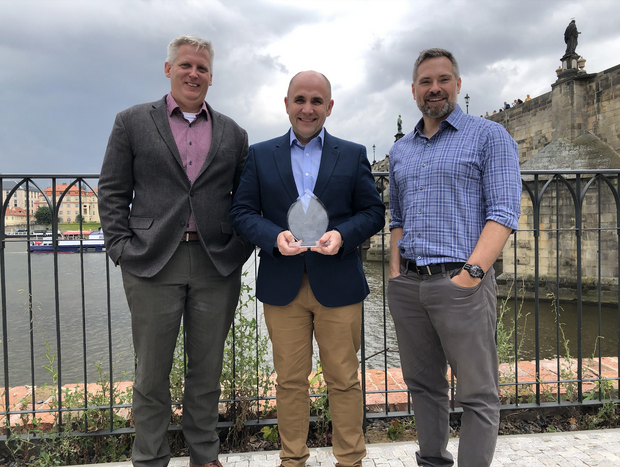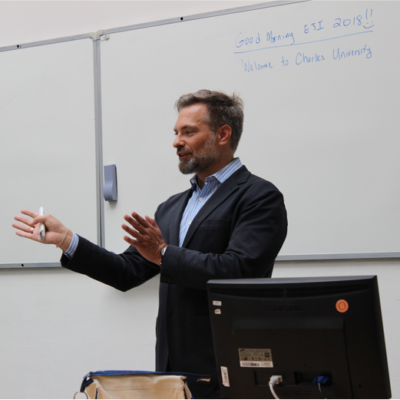David Blevins
Senior Ireland Correspondent, Sky News
@skydavidblevins
‘’Could objective journalism help defeat the tyranny all over the world?’’
Catalina Ramos, Chile
‘’His presentation was encouraging, teaching us that Journalism is the lifeblood of democracy and it’s our job to inform the news, always in an integrated and authentic way. I feel so grateful to have been part of his class and the outstanding program of EJI 2019!’’
David Blevins has started his inspiring lecture about hope, history and rhyme by telling all we need to know about the Ireland a.k.a. ‘’The Emerald Isle’’ . The Game of Thrones, the first airport duty free stores in the world and the famous sham rock originated from the ‘’Land of Saints and Scholars’’. But there was something more important to learn about Ireland. Something that has been and still is one of the key points of their history and their identity. The Northern Ireland conflict with its more recent phase between 1968 and 1998 has left a huge mark on all Irish people.
Mr Blevins has borrowed the concept of “The hope, history and rhyme’’ from ‘’The Cure at Troy’’, a poem by Seamus Heaney. A journalist, that has become a theologist, infected everyone with his story of hope: his religion brought him closer to his passion, journalism.
OUR HISTORY
‘’In the Republic [of Ireland], Catholics are in the majority. In Northern Ireland, Protestants are in the majority. Now, fasten your seat belt for the shortest history lesson ever. [Saint] Patrick had been a slave in Ireland but felt called back, so he returned with Christianity and education … When Vikings invaded, Ireland sought help from England but the English overstayed their welcome. Cue the charming King Henry the Eighth. He didn’t have any Irish wives to chop the head off so he chopped the head off the Catholic Church instead. England crushed Ireland’s resistance, confiscated the land and sent 10,000 Protestant Scots to settle in the north. A territorial dispute had become a religious dispute. That was 800 years in 100 words. 1916 was the year of the uprising. The Irish rebels who led it were executed. But by 1921, the British had agreed to divide Ireland. Violent republicans continued their attempt to bomb and shoot the British out altogether. The most recent phase of the conflict (1968- 1998) claimed 3,600 lives, from a population of just 1.8 million people in Northern Ireland. Outlawed groups like the Irish Republican Army claimed 2,000 lives. Loyalist groups claimed 1,000. British security forces killed at least 350. ‘’
OUR HOPE
“Breaking news in the last few minutes, the IRA has declared a complete and unequivocal ceasefire.
“Can you imagine the hope those few words brought for a radio news-anchor who’d grown up in an area known as “the murder triangle?” Two months later, the loyalists reciprocated. For the first time in my lifetime, the scene was set for peace talks. It took another four years for our hope to become reality. ”
OUR RHYME
Mr Blevins discussed the role of the Irish media and journalists in this conflict. According to him, the Irish journalists contributed to the ethical and integrate coverage of the conflict in three main ways:
- Every voice was heard
Journalists have provided a balanced reporting of all sides of the conflict.
‘’At the height of the conflict, British Prime Minister, Margaret Thatcher, imposed a broadcast ban on Gerry Adams. We circumvented the law by hiring an actor to voice his words. We didn’t endorse his position. We just ensured there was balance.’’
- Reading between the lines
Journalists were able to filter information and provide more accuracy, trying to avoid fake news and provocations.
‘’The two sides didn’t just disagree on the solution, they disagreed on the problem. Each came with its own version of history. Consensus required creative thinking – a broad political document. Journalists analysed it meticulously to help people make an informed decision ahead of the referendum. We didn’t try to influence the vote. We just tried to be accurate.’’
- A Space for good news
Talking only about the bad sides of the conflict would deprive people from the most important thing, which is their hope
‘’We made an effort to find those with more moderate views – Catholics and Protestants who were reaching out beyond the traditional boundaries.’’
“Once in a lifetime the longed for tidal wave of justice can rise up, and hope and history rhyme.”
By Viktorya Muradyan





